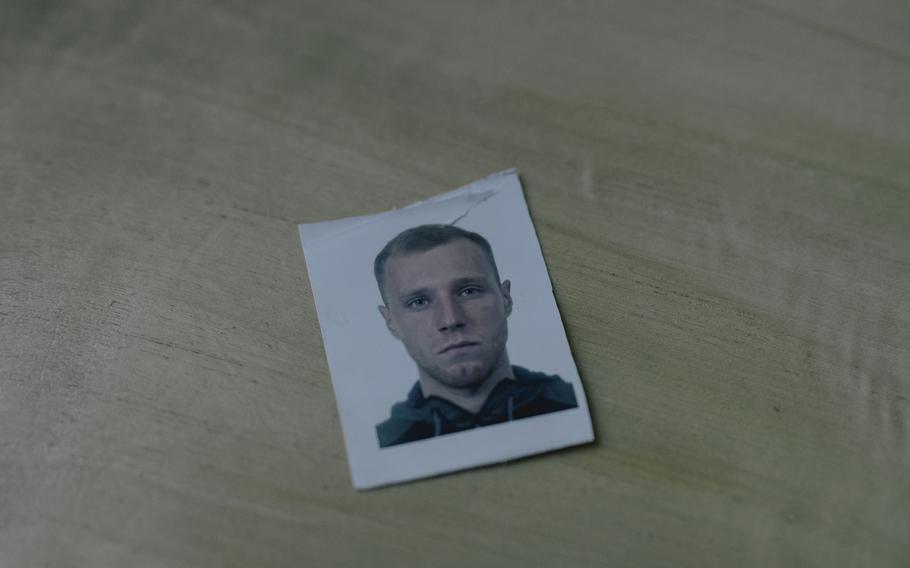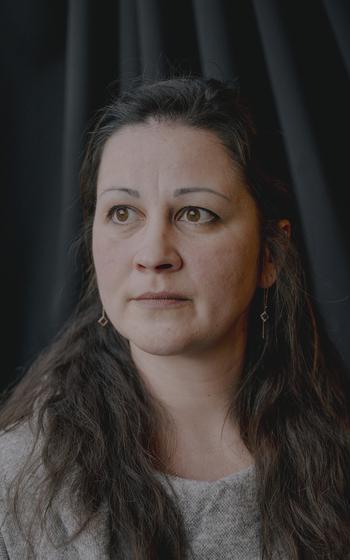Europe
Ukrainians are vanishing into Russia; these people track them down
The Washington Post February 9, 2025

A picture of Vladislav, Nadezhda and their son. (Fabian Ritter, DOCKS Collective for The Washington Post)
MOSCOW — The last time Nadezhda Yevdokimova saw her husband was nearly three years ago, when he was dragged from their car by Russian soldiers at a checkpoint in northeastern Ukraine littered with corpses and burned-out tanks.
That winter, after months of excruciating silence, Nadezhda, now in Europe, received a call from an unknown Russian number. Her husband, Vlad, was alive, said the voice on the phone, and was now being held in a prison inside Russia. The stranger had found her name and number on a tiny scrap of paper, smuggled out of Vlad’s cell in a spool of thread.
Nadezhda would later discover that the man who called her that day was part of a constellation of volunteers and insiders in Russia risking their lives — occasionally for money, but usually for nothing — to pass on crucial information about the Ukrainians who have vanished into Russia’s sprawling penal system.
Vlad is one of thousands of Ukrainian civilians who lawyers and activists say have been illegally swept up as Russian forces have advanced and occupied swaths of Ukrainian territory, disappearing into prisons, detention centers and torture cells across Russia and occupied Ukraine.
“I call this the biggest human rights crisis in modern Russia,” said Roman, a Moscow-based lawyer who has committed himself to working on the issue since 2022. The Washington Post is not identifying Roman by his full name, like several others interviewed for this article, because of the sensitivity of the topic and risk of backlash by Russian authorities.
“What is happening here is happening on a federal scale. Far more people are becoming victims of this system, and the numbers are astronomical,” he said.
A former Russian law enforcement official, who fled Russia, left her job and now helps Ukrainian families find their loved ones, said the situation is systemic.
“My own hair is standing on end from the absolute lawlessness that Russia is in right now,” the former official said. “The kidnapping of civilians is an element of terror. People are so scared that relatives are disappearing and it’s not clear where they are or when they’re coming back.”
As pressure is mounting on Ukraine and Russia to end the war, with President Donald Trump promising to soon meet with Russia’s Vladimir Putin and bring peace as quickly as possible, activists say the issue of captured Ukrainian civilians in Russia must top the agenda of any negotiations — even before questions of territorial concessions and security guarantees.
“As soon as there is a ceasefire, we must resolve these urgent humanitarian issues as fast as possible,” said Father Grigory Mikhnov-Vaytenko, a Russian priest who is working with Ukrainian and Russian authorities on the issue.
Few of these civilians have been released or exchanged, in contrast to the high-profile swaps of soldiers between the two countries. In a recent New Year’s exchange, just two of the 189 prisoners returned were civilians. The central question of why Russian authorities are grabbing civilians on such a scale and why more people haven’t been exchanged remains unanswered.
International governments have called on Russia to uphold its commitment to protecting civilians and investigate the abuses, but every day that the conflict drags on and Russian troops creep westward, more people are being taken.
The ‘frozen people’
The Ukrainian Center for Civil Liberties, a Nobel Prize-winning Ukrainian rights monitor, said in March that there were 7,000 civilians detained by Russia, while the Ukrainian government estimated almost a year later that the figure was more than double that.
Those working on the issue call the detained “the frozen people,” because of a loophole that means detained Ukrainian civilians do not exist in Russia’s penitentiary system before being charged. A small minority have faced criminal proceedings, often accused of terrorism or sabotage, but the rest are being held outside the legal framework, kept in prisons without any communication with the outside world.
“The persecuted are kept in terrible conditions, subjected to the harshest torture, they are not provided with effective protection. The courts do not meet the requirements of a fair trial, and are often held behind closed doors without public participation,” read a recent report by “First Flight,” an antiwar network of Russian activists based outside the country.
The Russian Defense Ministry maintains that the civilians are being held in accordance with the Geneva Conventions, but the convention on the protection of civilians during war prohibits the taking of civilian hostages.
Civilians, international norms say, can be detained only “in accordance with the laws and regulations of the occupying power,” with a guarantee of a fair trial and basic rights. None of those rules is being observed by Russian authorities, lawyers say. The Defense Ministry did not respond to The Post’s request for comment.
Oleksandr Sizyonov, 42, an evangelical priest from Berdyansk in southern Ukraine, was seized by Russians soldiers in April 2022 and held incommunicado for 15 days.
When Russian soldiers came to his home at dawn to arrest him, they put a bag over his head and accused him of sabotage. But Sizyonov, who had participated in rallies against the occupation was never officially charged.
The detailed account Sizyonov gave The Post of the physical and psychological torture he was subjected to is similar to those documented by human rights groups. The knowledge that there was no official legal procedure to protect him broke his spirit, Sizyonov said.
“You had to undress and lie down on a cold tile floor. They’d put one metal clasp on your big toe and another one on your earlobe, and they’d electrocute you,” he said. “This would happen for days. All night, until the morning.”
Sizyonov remembers the psychological terror of the sounds being worse than the physical torture. “When you hear the screaming of the people who are going through this … you understand you will never be able to forget it,” he said.
Most are seized in Ukraine’s occupied territories and are frequently accused of “opposing the special military operation” — Russia’s euphemism for its war — and are held on suspicion of spying or protesting the occupation. Often, they are detained because of past careers in the military or police.

Vlad was abducted from the Kharkiv region of Ukraine and taken to Russia, where he has been held in various prisons. (Fabian Ritter, DOCKS Collective for The Washington Post)
Those on the inside
The stranger who called Nadezhda that day, it later transpired, was a Russian prison guard working at the facility where Vlad was then incarcerated. For two months, they communicated via the messaging app Viber, and Nadezhda was finally able to establish what had happened to her husband.
Vlad had been captured by Russian troops and accused of opposing the war. He was then moved between prison colonies throughout southern Russia and near Moscow. The guard later told Nadezhda that his two sons in law had been drafted to fight and that one had been killed.
“He just wanted to help me as a human being,” she said, adding that he never asked for any compensation.
The guard appears to have been part of the unlikely cohort of people inside and outside Russia working to help detained Ukrainians, including priests, lawyers and even former members of law enforcement.
Several Ukrainians interviewed by The Post said Russian prison workers had sometimes offered to help, either out of compassion or for financial gain.
The loosely organized effort represents a rare case of Russian and Ukrainian cooperation as activist groups share information, connect relatives to their captured loved ones and communicate with each side’s authorities.
Mikhnov-Vaytenko, the Russian Orthodox priest, visits Ukrainian civilians awaiting trial inside occupied Crimea and Russia itself. The ones he meets are “fortunate” enough to be criminally charged and have passed through the frozen stage.
“We cannot stop this war,” Mikhnov-Vaytenko said. “But I can help keep some people safe. … The most important thing is that we remain human beings — a lot of people in Russia think like I do.”
Mikhnov-Vaytenko coordinates volunteer groups across Russia and said there are hundreds helping Ukrainian refugees and prisoners. “They are from totally different backgrounds, educations and age profiles,” he said. Many have Ukrainian relatives or family roots in Ukraine. Others just want to help.
Olga Romanova, a Russian journalist and activist based in Berlin, works with a group of 30 Ukrainian and Russian activists and lawyers who coordinate efforts inside Russia. She makes regular trips to Kyiv to keep the government apprised of her group’s efforts. So far, they have confirmed the names of 1,600 of those in captivity.
Each month, church groups pack up bundles of food and clothing for Ukrainian prisoners. Activists coordinate one-time volunteers to drop off cash at ATM machines, to keep the network of help running; the volunteers are often carefully disguised to avoid identification by the authorities. Romanova ensures volunteers have safety training and are prepared for emergency evacuations.
“The people doing this inside Russia, should remain hidden,” Romanova said, describing the climate of fear in wartime Russia. “In fact, there are very few people whom we know by name at all. Many work under nicknames.”
Roman, the lawyer, said the “wild injustice” of Russia’s invasion is deeply personal. He spends his days collecting information on missing Ukrainians and filing requests to the Investigative Committee, Russia’s top prosecutorial authority, to initiate legal searches for the vanished people.
“I believe that I must do something to counteract this or correct the consequences of this tragedy,” he said.

Nadezhda Yevdokimova, who fled Ukraine with her two children, in Lütgendortmund, her new home in Germany. (Fabian Ritter, DOCKS Collective for The Washington Post)
Two months ago, Nadezhda received another unexpected call. This time, it was from a recently returned Ukrainian prisoner of war who had found her contact through volunteers. He told her that he had shared a cell with Vlad for a year in a prison colony south of Moscow.
Vlad was still alive, he said — but he had lost all his teeth after several rounds of torture, including beatings with a shovel. Neither Ukrainian nor Russian authorities responded to The Post’s requests for comment on the process of exchanges and the issue of captured civilians.
Nadezhda copes by telling everyone she meets her husband’s story, sending requests and looking for clues.
“We were so in love. Really, that was real love,” she said. “So I believe — and I am waiting for him.”